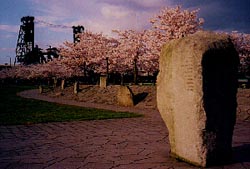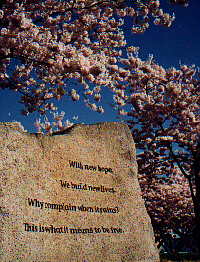Portland Hanami 2000
Japanese American Historical Plaza
Portland, Oregon, USA
|
The Japanese American Historical Plaza is a rock garden that
tells the story of the Japanese American experience through poetry
inscribed on the rocks: from immigration to internment, then
postwar feelings of bitterness, loss and hope for the future.
Plaques with the text of the American citizen's Bill of Rights
and the
1988 Redress Agreement form the bookends.
("Footprints of 100 years trace the history of Japanese Americans") | ||

|
The name of the river that runs through Portland is tricky even for native speakers of English; Oregonians pronounce it "Wi-LAM-it". | |
| To the U.S.-born nisei (second generation), being interned meant, "You are not real Americans." |
Sure, I go to school
Same as you. I'm an American | |
|
Rounded up
In the sweltering yard. Unable to endure any longer Standing in line Some collapse. | Fairgrounds and stockyards were the only places large enough for an operation as big as the Internment. (In Portland, the Expo grounds by the raceway were used.) Internees had to get used to line ups during their time in camp. | |
| The Internment made Nikkei-jin question the value of their heritage. | Who? What? Where? When? Why? | |
|
Black smoke rolls
Across the blue sky. Winter chills our bones. This is Minidoka. | Most of the Portland-area Nikkei-jin were interned at the Minidoka camp, in remote Hunt, Idaho. | |
| Made up of volunteers from the internment camps, the 442nd Regimental Combat Team fought with honor in Europe, even as their families remained incarcerated in America. |
Our young men and women
Joined the army, too. They are proud to be American. | |
|
Going home,
Feeling cheated. Gripping my daughter's hand. I tell her we're leaving Without emotion. | After their release, JAs were silent about the Internment, ashamed about having been imprisoned -- for the "crime" of being who they were. | |
|
Nikkei-jin faced an uncertain future after the Internment
|
Through the car window
A glimpse of pines. Oregon mountains. My heart beats faster. Going home. | |
|
Glancing up at red-tinged mountains
My heart is softened. A day in deep autumn. |
 |
|
| There were internees who were "repatriated" to war-torn Japan, a country some had never seen. |
War and change,
My native land. Once so hard to leave Is behind me now forever. | |
|
Just over there Was our old community. Echoes! Echoes! Echoes! | The site of Portland's pre-war Japantown is just across the Naito Expressway from the JA Historical Plaza | |

|
(There are sunny days in Portland -- when it isn't raining.) | |
|
Nichibei no bunka ga niou -- Bara no Machi
(Breathe the fragrance of the exchange of Japanese and American culture in The City of Roses) | Today in Portland, "The City of Roses", sushi restaurants are as common as Starbucks, and signs advertising bento and teriyaki abound. One of the major tourist attractions is the Japanese Garden. | |